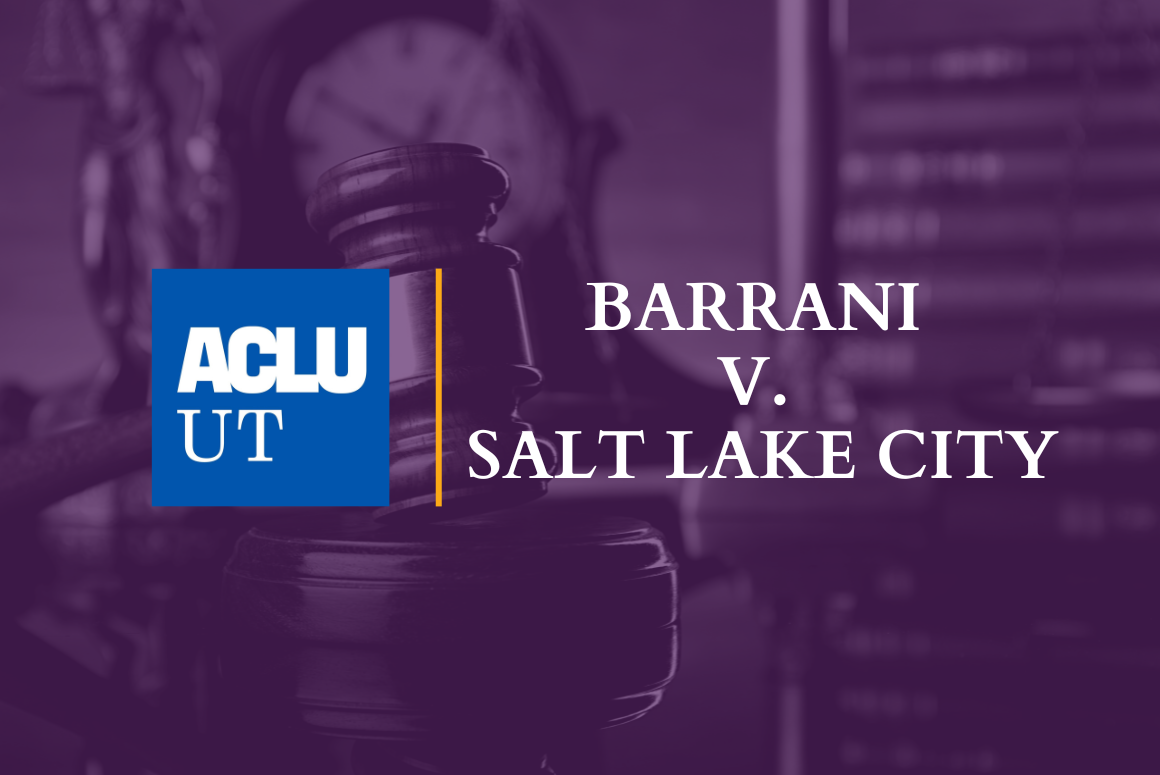Amicus Barrani v. Salt Lake City
- Filed: November 7, 2023
- Status: Amicus Curiae
- Latest Update: Nov 20, 2023

The ACLU’s State Supreme Court Initiative and Trone Center for Justice and Equality, along with the ACLU of Utah and the Salt Lake Legal Defenders Association, filed an amicus brief defending the civil rights and liberties of people experiencing homelessness.
What’s at Stake
Hundreds if not thousands of Salt Lake City, Utah, residents have nowhere safe to stay and must live and sleep in public. This case—brought by a small group of residents and businesses—involves the question of whether this citywide homelessness crisis qualifies as interfering with their rights under Utah state law. It also presents the question of whether Salt Lake City can be ordered to clear encampments, forcibly relocate people who are unhoused, and enforce vague and overbroad laws punishing people for experiencing homelessness. We cannot arrest our way out of homelessness. Costly fines, fees, and arrests likely violate unhoused people’s state and federal constitutional rights. The ACLU’s State Supreme Court Initiative and Trone Center for Justice and Equality, along with the ACLU of Utah and the Salt Lake Legal Defenders Association, filed an amicus brief defending the civil rights and liberties of people experiencing homelessness.
About our Amicus Brief Defending the Rights of People Experiencing Homelessness
Our brief argues that the court should protect the rights of people who are experiencing homelessness. Excessive fines and punishment for the unavoidable consequences of being unhoused likely result in the city violating the federal and state constitutional rights of unhoused Utahns.
An injunction would require dismantling campsites that unhoused people rely on to survive, forcibly relocating people experiencing homelessness to unknown and undetermined locations. It would also make the problem of homelessness worse, not better. Clearing encampments further erodes trust between our unhoused neighbors and the government, making it harder to end homelessness. The time and tax-payer money used evicting encampments and spent forcing unsheltered individuals into the criminal legal system could be redirected toward services and housing that address the systemic issues of homelessness.
- 11/07/2023 240327_decision_on_mtd.pdf
- 11/07/2023 231107_barrani_mtf_amicus.pdf
- 11/07/2023 231102_slcs_motion_to_dismiss.pdf
- 11/07/2023 231102_slcs_opp_to_ps_app_for_prelim_inj.pdf
- 11/07/2023 231107_barrani_aclu_amicus_brief_1.pdf
- 11/07/2023 230928_barrani_app_for_pi.pdf
- 11/07/2023 230928_barrani_complaint.pdf
- 07/31/2025 Ruling from The Supreme Court of Utah
Date Filed: 11/07/2023
Affiliate: UT
Download documentDate Filed: 11/07/2023
Affiliate: UT
Download documentDate Filed: 11/07/2023
Affiliate: UT
Download documentDate Filed: 11/07/2023
Affiliate: UT
Download documentDate Filed: 11/07/2023
Affiliate: UT
Download documentDate Filed: 11/07/2023
Affiliate: UT
Download documentDate Filed: 11/07/2023
Affiliate: UT
Download documentDate Filed: 07/31/2025
Affiliate: UT
Download documentLearn More About the Issues in This Case
Stay Informed
Sign up to be the first to hear about how to take action.
By completing this form, I agree to receive occasional emails per the terms of the ACLU’s privacy statement.
By completing this form, I agree to receive occasional emails per the terms of the ACLU’s privacy statement.
